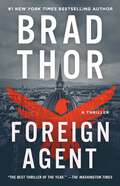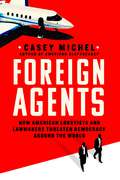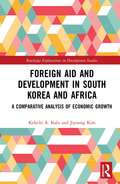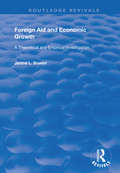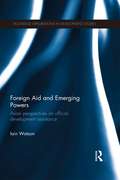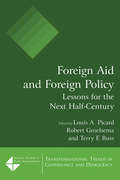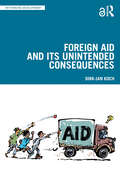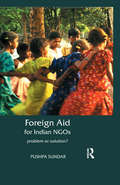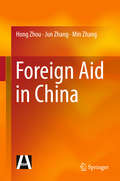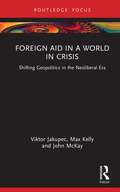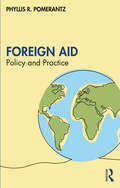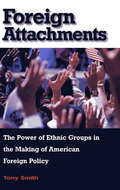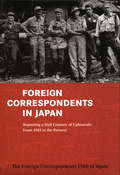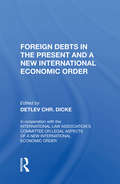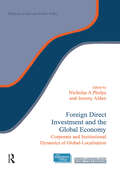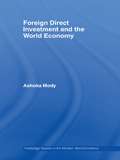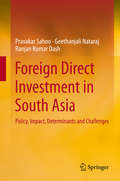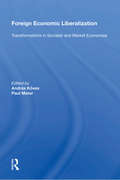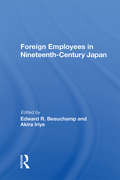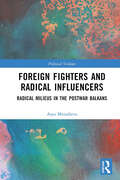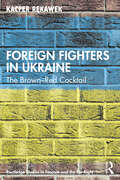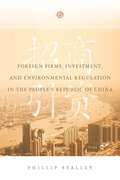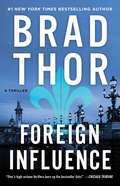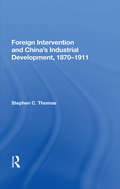- Table View
- List View
Foreign Agent: A Thriller (The Scot Harvath Series #15)
by Brad Thor&“The best thriller of the year...an exciting and entertaining read.&” —The Washington Times &“A top-notch thriller.&” —Bill O&’Reilly From #1 New York Times and #1 Wall Street Journal bestselling author Brad Thor—a brilliant thriller as &“current as tomorrow&’s headlines&” (Dan Brown, #1 New York Times bestselling author). Terrorism in Europe has spun out of control. The United States has decided on a dramatic response. Now, the CIA needs a very special kind of operative.Scot Harvath has exactly the skills the CIA is looking for. He&’s a former U.S. Navy SEAL with extensive experience in espionage. Working for a private intelligence company, he will provide the CIA, and more important, the President, with absolute deniability. But deep within the Russian Caucasus, Moscow also has its own special kind of operative. As a child, Sacha Baseyev endured an unimaginable horror. Today, he lives and breathes for only one reason—to kill. And he will kill as many Americans as it takes to accomplish his mission. When a clandestine American operations team is ambushed near Syria, all signs point toward a dangerous informant in Brussels. But as Harvath searches for the man, he uncovers another actor—a rogue player hell-bent on forcing America&’s hand and drawing it into a confrontation deadlier than anyone could have imagined. As the attacks mount, and terror is brought to the very doorstep of the White House, Harvath finds himself in the race of his life. From Vienna, Brussels, and Berlin, to Malta, Jordan, and Syria—he will push himself beyond the edge in order to confront one of the greatest evils the world has ever known.
Foreign Agents: How American Lobbyists and Lawmakers Threaten Democracy Around the World
by Casey MichelA stunning investigation and indictment of a segment of the United States' foreign lobbying industry, and the threat to end democracy.For years, one group of Americans has worked as foot-soldiers for the most authoritarian regimes around the planet. In the process, they've not only entrenched dictatorships and spread kleptocratic networks, but they've secretly guided U.S. policy without the rest of America even being aware. And now, some of them have begun turning their sights on American democracy itself.These Americans are known as foreign lobbyists, and many of them spent years ushering dictatorships directly into the halls of Washington, all while laundering the reputations of the most heinous, repressive regimes in the process. These foreign lobbyists include figures like Ivy Lee, the inventor of the public relations industry—a man who whitewashed Mussolini, opened doors to the Soviets, and advised the Nazis on how to sway American audiences. They include people like Paul Manafort, who invented lobbying as we know it—and who then took his talents to autocrats from Ukraine to the Philippines, and then back to the White House. And they now include an increasing number of Americans elsewhere: in law firms and consultancies, among PR specialists and former lawmakers, and even within think tanks and universities.In Foreign Agents, Casey Michel shines a light on these foreign lobbyists as some of them—after decades of installing dictators and corrupting American policy—embark on their next mission: to end America’s democratic experiment, once and for all.
Foreign Aid and Development in South Korea and Africa: A Comparative Analysis of Economic Growth (Routledge Explorations in Development Studies)
by Kelechi A. Kalu Jiyoung KimThis book compares the rapid development of South Korea over the past 70 years with selected countries in sub-Saharan Africa to assess what factors contributed to the country’s success story, and why it is that countries that were comparable in the past continue to experience challenges in achieving and sustaining economic growth. In the 1950s, South Korea’s GDP per capita was $876, roughly comparable with that of Cote d’Ivoire and somewhat below Ghana’s. The country’s subsequent transformation from a war-ravaged, international aid-dependent economy to the 13th largest economy in the world has been the focus of considerable international admiration and attention. But how was it that South Korea succeeded in multiplying its GDP per capita by a factor of 23, while other Less Developed Countries continue to experience challenges? This book compares South Korea’s politics of development and foreign assistance with that of Ghana, Nigeria, and Zambia, which were also major recipients of the U.S. aid, to investigate the specific contexts that made it possible for South Korea to achieve success. Overall, this book argues that effective state capacity in South Korea’s domestic and international politics provided an anchor for diplomatic engagement with donors and guided domestic political actors in the effective use of aid for economic development. This book will be of interest to researchers and students working on development, comparative political economy, and foreign aid, and to policy makers and practitioners looking for a greater understanding of comparative development trajectories.
Foreign Aid and Economic Growth: A Theoretical and Empirical Investigation (Routledge Revivals)
by Janine L. BowenPublished in 1998, this book provides an empirical analysis of the impact of foreign economic aid in 67 developed countries over a 19 year period. The results include the relationships between aid and growth and the implication that methodologies traditionally used have been largely responsible for inconsistent findings in the past.
Foreign Aid and Emerging Powers: Asian Perspectives on Official Development Assistance (Routledge Explorations in Development Studies)
by Iain WatsonCurrent debates on emerging powers as foreign aid donors often fail to examine the myriad geopolitical, geoeconomic and geocultural tensions that influence policies of Official Development Assistance (ODA). This book advocates a regional geopolitical approach to explaining donor-donor relationships and provides a multidisciplinary critical assessment of the contemporary debates on emerging powers and foreign aid, bringing together economic and geopolitical approaches in the light of the 2015 completion of the Millennium Development Goals (MDGs). Moving away from established debates assessing the advantages and disadvantages of foreign aid, this book challenges the current geopolitical assumptions of the emerging powers concerning issues such as 'south-south' solidarity, shared development experience and 'multipolarity'. It analyses how donor governments 'sell' aid to recipients through enabling different cultural assumptions and soft power narratives of national identity and provides empirical evidence on agendas such as aid effectiveness, aid for trade, public-private partnerships, and green growth aid. The book examines the role of, and relationships between, the leading traditional and emerging power Asian donors specifically, and explores the different and contested perspectives and patterns of ODA policy through an alternative account of emerging power foreign aid to leading African and Asian recipients. This book provides a valuable resource for postgraduate students and practitioners across disciplines such as development economics and geopolitics of development, uniquely approaching the debate from the perspective of emerging powers and donors.
Foreign Aid and Foreign Policy: Lessons for the Next Half-century (Transformational Trends In Governance And Democracy Ser.)
by Terry F. Buss Louis A. Picard Robert GroelsemaThis timely work presents cutting-edge analysis of the problems of U.S. foreign assistance programs - why these problems have not been solved in the past, and how they might be solved in the future. The book focuses primarily on U.S. foreign assistance and foreign policy as they apply to nation building, governance, and democratization. The expert contributors examine issues currently in play, and also trace the history and evolution of many of these problems over the years. They address policy concerns as well as management and organizational factors as they affect programs and policies. "Foreign Aid and Foreign Policy" includes several chapter-length case studies (on Iraq, Pakistan, Ghana, Haiti, and various countries in Eastern Europe and Africa), but the bulk of the book presents broad coverage of general topics such as foreign aid and security, NGOs and foreign aid, capacity building, and building democracy abroad. Each chapter offers recommendations on how to improve the U.S. system of aid in the context of foreign policy.
Foreign Aid and Its Unintended Consequences (Rethinking Development)
by Dirk-Jan KochForeign aid and international development frequently bring with it a range of unintended consequences, both negative and positive. This book delves into these consequences, providing a fresh and comprehensive guide to understanding and addressing them. The book starts by laying out a theoretical framework based on complexity thinking, before going on to explore the ten most prevalent kinds of unintended effects of foreign aid: backlash effects, conflict effects, migration and resettlement effects, price effects, marginalization effects, behavioural effects, negative spillover effects, governance effects, environmental effects, and ripple effects. Each chapter revolves around a set of concrete case studies, analysing the mechanisms underpinning the unintended effects and proposing ways in which policymakers, practitioners, and evaluators can tackle negative side effects and maximize positive side effects. The book also includes personal testimonies, a succinct overview of unintended effects, and suggestions for further reading. Providing a clear overview of what side effects to anticipate when planning, executing, and evaluating aid, this book will be an important resource for students, development practitioners, and policymakers alike.
Foreign Aid and Real Exchange Rate Adjustments in a Financially Constrained Dependent Economy*
by Valerie Cerra Serpil Tekin Stephen J. TurnovskyA report from the International Monetary Fund.
Foreign Aid for Indian NGOs: Problem or Solution?
by Pushpa SundarThis book explores what difference development aid has made to the size, complexity, style of functioning, values and future direction of the NGO sector in India. It does this, first, by giving a comprehensive documentation of the experience of Indian NGOs with foreign aid since Independence. Simultaneously, it also analyses, in a broad historical perspective, some of the issues which are the subject of contemporary debate regarding the voluntary sector and aid, such as who decides ‘what’ is development and ‘how’ it should be brought about; whether foreign donors have hidden agendas, and if their aid amounts to cultural imperialism; and whether aid has made NGOs more self-reliant.The book also looks at the tripartite relationship between NGOs, donors, and governments, examining, for instance, whether the government is justified in imposing restrictions on receipt of funds by NGOs on the grounds that terrorist activities and religiously motivated communal strife are often financed with funds from abroad, with NGOs being used as fronts for both.
Foreign Aid in China
by Jun Zhang Min Zhang Hong ZhouForeign aid has connected China and the international community through many channels, and created new types of strong partnerships throughout the world. As a recipient country, China and donors have engaged in an unprecedentedly deep level of cooperation on development-related issues. China's development experience has resulted in key changes to the relationships and partnerships between China and donors, from receiving foreign aid to entering into development cooperation. China has provided valuable experiences for other developing countries, experiences that are all the more relevant because they have revealed key factors at work in developing recipient countries. This has also led China to form closer cooperative relationships with other developing countries with regard to development issues. In short, foreign aid has changed China.
Foreign Aid in a World in Crisis: Shifting Geopolitics in the Neoliberal Era (Routledge Explorations in Development Studies)
by Viktor Jakupec John McKay Max KellyThis book investigates the geopoliticisation of foreign aid in recent years, against a background of global overarching crises such as climate change, conflict, Covid-19, economic crisis, energy shortages and migration.Foreign aid has historically been understood as assisting both with the development objectives of the recipients and with the trade and geopolitical interests of the donors. In the first decades of the 21st century, however, this balance has been shifted by a series of complex global challenges. This book argues that donors have now moved towards framing aid as a geopolitical instrument, wherein aid can be given or withheld based on power or political intent, thus imposing the donor’s specific values and norms. This book provides an in-depth analysis of this weaponisation of foreign aid within a framework of global disruption and ultimately concludes that the world is at a tipping point towards a new socio-political world order.Asking important questions about the power dynamics at play within the aid sector, this book will be an important read for researchers across development studies, political science, international relations and global affairs.
Foreign Aid: Policy and Practice
by Phyllis R. PomerantzForeign Aid: Policy and Practice offers a complete overview of the basics of foreign aid. Who is it for? Who pays for it? Why does it exist? What is it spent on? How much is it? And most important, does it work? The aid debate has been flooded by academic studies and popular books that either challenge or champion the effectiveness of aid. Most presume that the reader already knows the basic facts and characteristics of the aid industry. This book provides readers with a comprehensive summary of the background, actors, core principles and policies, and intended (and unintended) outcomes of foreign aid, followed by a more informed and balanced treatment of the key controversies and trends in aid today. Drawing on the author’s 25 years’ experience in development practice and 15 years in teaching, the book reflects on recent efforts to accelerate aid’s impact and concludes by taking a look at the future of aid and the headwinds it will face in the first half of the 21st century. Perfect for university teaching at advanced undergraduate and graduate levels, this book will also encourage development practitioners, policy makers, and members of the public to engage in more informed debates about aid and development finance.
Foreign Attachments: The Power of Ethnic Groups in the Making of American Foreign Policy
by Tony SmithWho speaks for America in world affairs? In this insightful new book, Tony Smith finds that, often, the answer is interest groups, including ethnic ones. This seems natural in a country defined by ethnic and cultural diversity and a democratic political system. And yet, should not the nation's foreign policy be based on more general interests? On American national interests? In exploring this question, Smith ranges over the history of ethnic group involvement in foreign affairs; he notes the openness of our political system to interest groups; and he investigates the relationship between multiculturalism and U.S. foreign policy. The book has three major propositions. First, ethnic groups play a larger role in the formulation of American foreign policy than is widely recognized. Second, the negative consequences of ethnic group involvement today outweigh the benefits this activism at times confers on America in world affairs. And third, the tensions of a pluralist democracy are particularly apparent in the making of foreign policy, where the self-interested demands of a host of domestic actors raise an enduring problem of democratic citizenship--the need to reconcile general and particular interests.
Foreign Correspondents in Japan
by Charles PomeroySince its founding in 1945, the Foreign Correspondents Club of Japan (FCCJ) has been a haven for working journalists. From its origins at "No. 1 Shimbun Alley" in the ruins of Tokyo immediately after World War II, the club quickly took on a life of its own. At times it became like a miniature United Nations, meeting the needs of hundreds of foreign journalists from around the world, who used it as a working press center as well as a social oasis.Club members, who include several Pulitzer Prize winners, have personally witnessed and reported on some of the most momentous events of the last half century-the end of World War II and the occupation of Japan; the revolution in China; the Korean War; Vietnam and the student riots of the 1960s; the height of the Cold War; Japan's economic miracle and the subsequent collapse of the "bubble" economy; the death of Emperor Hirohito; and much more.Foreign Correspondents in Japan gives an intimate and colorful look at these journalists who covered Asia for the rest of the world during five decades of sweeping change, and provides first-person accounts of history as it was being written.
Foreign Debts In The Present And A New International Economic Order
by Detlev CHR. DickeThis book presents the step-by-step approach towards a more just and equitable International Economic Order, an equilibrium of interests based on understanding and experience in a rapidly changing world and discusses the problem of foreign debt in the present and a New International Economic Order.
Foreign Direct Investment and the Global Economy: Corporate and Institutional Dynamics of Global-Localisation (ISSN)
by Jeremy Alden Nicholas A PhelpsWith the emergence of a truly global marketplace, regions now face far greater competition in attracting outside investment, and multinational companies have to consider local conditions on many levels before choosing to invest. Foreign Direct Investment and the Global Economy looks at the pattern of FDI and its impacts on the global, regional (trade block), national and sub-national scales. The contributors describe the much discussed global-local interlay apparent in the operations of multinational companies and their involvement with 'regulatory' institutions at different levels, from the global to the local.
Foreign Direct Investment and the World Economy (Routledge Studies in the Modern World Economy #Vol. 62)
by Ashoka ModyAsking the question of whether Foreign Direct Investment (FDI) is 'integrating' the world economy, this comprehensive volume consists of an overview of current FDI research. While the term 'integrating' is often used, the real test should be whether FDI is instrumental in bringing per capita incomes across countries closer together. By this yardstick, the answer is no. The forces driving FDI are strong; they lead it to flow to countries with attractive investment conditions and, moreover, investors have a tendency to follow each other. It is in such settings that FDI appears to have the most beneficial effect in raising growth. Written by an authority in this area, Ashoka Mody, this book will greatly appeal to all international and development economists.
Foreign Direct Investment in South Asia
by Pravakar Sahoo Geethanjali Nataraj Ranjan Kumar DashDuring the 1990s, the governments of South Asian countries acted as 'facilitators' to attract FDI. As a result, the inflow of FDI increased. However, to become an attractive FDI destination as China, Singapore, or Brazil, South Asia has to improve the local conditions of doing business. This book, based on research that blends theory, empirical evidence, and policy, asks and attempts to answer a few core questions relevant to FDI policy in South Asian countries: Which major reforms have succeeded? What are the factors that influence FDI inflows? What has been the impact of FDI on macroeconomic performance? Which policy priorities/reforms needed to boost FDI are pending? These questions and answers should interest policy makers, academics, and all those interested in FDI in the South Asian region and in India, Pakistan, Bangladesh, Sri Lanka and Pakistan.
Foreign Economic Liberalization: Transformations In Socialist And Market Economies
by András Köves Paul MarerThis groundbreaking volume combines theories of economic liberalization with a wide variety of case studies from market and socialist economies. Internationally regarded scholars and Eastern European policymakers have collaborated to evaluate the dramatic economic changes taking place throughout the world. The opening essays contribute to the theoretical debate by showing that foreign economic liberalization goes beyond reducing import barriers to policies on investment, financial liberalization, convertability, and export promotion. Case studies compare successful and unsuccessful liberalization attempts world wide. The disintegration of the CMEA and the policy dilemmas facing Central and Eastern Europe are examined in great detail, as the authors explore the pitfalls and opportunities inherent in the transformation from a centrally planned economy. This up-to-date text will be invaluable for courses on the history and transformation of socialist economies, comparative economic systems, and international trade and investment.
Foreign Employees In Nineteenth Century Japan
by Edward R BeauchampThe product of research by US and Japanese scholars, this book is an assessment of the work of individual "yatoi", and their contributions to the rapid development that characterized Meiji Japan (1868-1912).
Foreign Fighters and Radical Influencers: Radical Milieus in the Postwar Balkans (Political Violence)
by Asya MetodievaThis book looks at Salafi influencers and foreign fighters in the Balkans to examine how the origins and dynamics of radical milieus are related to the legacy of the Bosnian War and the Kosovo War. The work seeks to understand if and in what ways these wars influenced the consolidation of radical milieus and whether they impacted the recruitment of foreign fighters. In doing so, the book traces the path of more than 400 individuals that either traveled to Syria or were involved in recruitment locally. Employing a qualitative methodological approach, the book argues that radical influencers are likely to be more evident in postwar societies due to state and societal fragility, which create more power for social actors and constrain efforts to counter extremism. Through the activism of social actors emerging from wars, preceding conflicts resonate through society across different locations and particular postwar radical milieus do not need to be only in the place where war atrocities happened. Thus, radical milieus can spread to various locations including countries hosting postwar diaspora communities. This book will be of much interest to students of radicalisation, terrorism and political violence, Balkan politics, Middle Eastern politics, and IR in general.
Foreign Fighters in Ukraine: The Brown–Red Cocktail (Routledge Studies in Fascism and the Far Right)
by Kacper RękawekForeign Fighters in Ukraine is the first comprehensive academic study taking an in-depth look at foreigners who have chosen to fight in the conflict in Ukraine. While there has been considerable focus in policy, security and academic circles on the threat from returning jihadists – so-called returnee foreign terrorist fighters – the same danger from right-wing, but not essentially terrorist, extremists and others has been largely overlooked. As Westerners rushed to join the nascent Caliphate in Syria/Iraq, others simultaneously traveled to another foreign war on what many would call Europe’s doorstep: the Russo-Ukrainian war. This book unmasks this largely unknown group of fighters as the author dives into the fighters’ ideological and social backgrounds, their motivations for joining the conflict, their travails on the way there and their battle record in Eastern Ukraine. To a large extent based on interviews with the fighters themselves, it is a study on how and why men risk their lives while fighting a foreign war – and attract the attention of security services at home upon their return. Particularly, given the Russian invasion of Ukraine in February 2022 and the growing interest in far-right violence worldwide, the book evaluates whether these returnees constitute another security threat to the West. This volume will be of interest to all those researching small wars, terrorism, peace and conflict studies and right-wing extremism.
Foreign Firms, Investment, and Environmental Regulation in the People's Republic of China
by Phillip StalleyThis new book takes as its focus a simple yet critical question: Does foreign direct investment lead to weakened environmental regulation, thereby turning developing countries into "pollution havens"? The debate over this question has never before been the focus of a book about China. Phillip Stalley examines the development of Chinese law governing the environmental impact of foreign investors, describes how regional competition for investment has influenced environmental regulation, and analyzes the environmental practices of foreign and Chinese companies. He finds only modest evidence that integration with the global economy has transformed China into a pollution haven. Indeed, after China opened its domestic market, the entry of foreign films largely strengthened the environmental protection regime, including the oversight of foreign firms' environmental practices. Nevertheless, foreign firms (and the competition to lure them) have posed new challenges to controlling industrial pollution. Stalley identifies the conditions under which foreign investment contributes to and undermines environmental protection, offering readers a solid understanding of China's environmental challenges. He also builds on existing theory and provides hypotheses that can be tested with other developing nations.
Foreign Influence: A Thriller (The Scot Harvath Series #9)
by Brad ThorNavy SEAL turned covert operative Scot Harvath is called to action once again in this pulse-pounding political thriller from #1 New York Times and #1 Wall Street Journal bestselling author Brad Thor.Buried within the black ops budgets of the Department of Defense, a new spy agency has been created. Unfettered by the oversight of self-serving politicians, it reports only to a secret panel of insiders. Its job is to target America&’s enemies—both foreign and domestic—under a charter of three simple words: Find, Fix, and Finish. Recruited as a field operative, Scot Harvath has just returned from his first assignment abroad when a bombing in Rome kills a group of American college students. The evidence points to a dangerous colleague from Harvath&’s past and a plan for further attacks on an unimaginable scale. Harvath is tasked with leveraging his relationship to lure the man out of hiding and kill him on the spot. But what if he has the wrong man? Simultaneously, a young woman is struck by a taxi in a hit-and-run in Chicago. With only two intoxicated witnesses and over five thousand cabs in the city, the Chicago Police have given up on their investigation. But when the family&’s attorney digs deeper, he will uncover a shocking connection to the bombing in Rome and the perpetrators&’ plans for America. As the story rockets to its conclusion, the plots intersect in a race to prevent one of the most audacious and unthinkable acts of terror in the history of mankind.
Foreign Intervention And China's Industrial Development, 1870-1911
by Stephen C ThomasMore than one hundred years ago, imperial Chinese leaders tried to industrialize their nation, much as China's leaders are attempting today. Self-strengthening projects in industry and the military were implemented to increase China's wealth and power and to protect the country from further colonization by the Western powers of the nineteenth centu
